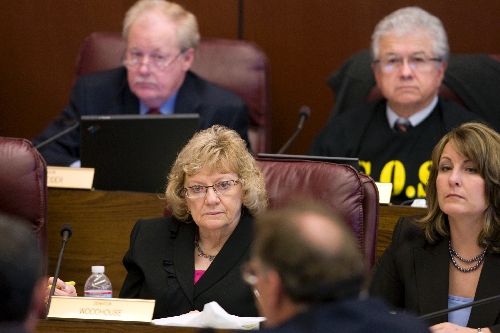Gibbons says he’ll veto bill that could block school aid

CARSON CITY — Gov. Jim Gibbons intends to veto a bill passed Wednesday evening by the Legislature because it would actually prevent the state from securing a $175 million federal Race to the Top grant that would help schools, his spokesman said.
The Senate voted 16-5 and the Assembly 42-0 to change a state law that has prevented Nevada from even applying for the grant. Five of the nine Senate Republicans voted against the bill on grounds that language in Senate Bill 2 still would lead the federal Department of Education to reject a state application for a grant.
But based on Wednesday’s vote, there are more than enough votes to override the governor’s veto.
Daniel Burns, Gibbons’ communications director, said the governor will veto the bill because the state, in applying for the competitive grants, would be hampered if the bill becomes law. He added the administration was told by the secretary of the Department of Education that any points Nevada loses make it less likely the state will receive funds.
"Once again the Legislature is showing they are more concerned about what the union wants than what the schools need," he said. The teachers union, Burns maintains, still wants to try to prevent schools from evaluating teachers based on how students perform.
Nevada had been prevented from applying for the federal grant because of a 2003 state law that says teachers cannot be evaluated based on how their students fare in standardized tests.
Instead of that language, the Legislature passed a bill that states student test score information "must be considered, but must not be used as the sole criterion, in evaluating the performance of, or taking disciplinary action against an individual teacher, paraprofessional, or other employee."
Sen. Joyce Woodhouse, D-Henderson, said the bill contains language that removes "the barrier" that prevented the state from applying for the grant.
But she added she does not have any assurance from the U.S. Department of Education that the language is as strong as it should be.
"The Department of Education would not tell us that," she said. "These are competitive grants and they don’t want to say anything that would give one state an advantage over another."
Woodhouse chaired the Committee on Education that developed the language in the bill. She said the committee did talk with the Nevada State Education Association about the language, but also heard from school districts and many other interest groups.
If the state secures a grant, which she said could be between $60 million and $175 million, the funds could be used for education reforms, like starting empowerment schools and other programs that schools develop on their own.
"It is going to be their call," added Woodhouse, a former teacher.
But she said funds won’t come before summer and could not be used to help reduce the state’s $887 million revenue shortfall, the reason Gibbons called the Legislature Tuesday into a special session.
Contact Capital Bureau Chief Ed Vogel at evogel@ reviewjournal.com or 775-687-3901.












